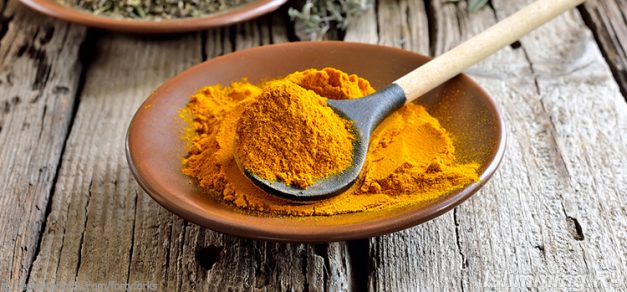Turmeric: Weight Loss and Treatment - Over 15 Proven Health Benefits - part II

- Patients with arthritis and joint pain respond very well to curcumin
Arthritis is a common problem. There are several different types, but most of them include some inflammation and joint pain.
Given that curcumin is a powerful anti-inflammatory herb, it is logical that it may be helpful in arthritis. Several studies prove that this is true.
In a study of patients with rheumatoid arthritis, curcumin was found to be even more effective than prescription anti-inflammatory medicine (study).
Many other studies looked at the effects of curcumin on arthritis and noted improvements in various symptoms.
Brief: Arthritis is a common disease characterized by joint inflammation and pain. Many studies have shown that curcumin can help treat the symptoms of arthritis and in some cases have been shown to be more effective than prescription anti-inflammatory drugs.
- Curcumin has incredible benefits against depression

Studies have shown that the active substance in turmeric may be a strong natural antidepressant.
A controlled trial was conducted on 60 patients randomly divided into three groups.
One group took prozac *, the second group took 1 gram of curcumin per tablet, and the third took prozac and curcumin in combination.
After 6 weeks, curcumin has been judged to have resulted in improvements similar to those of antidepressant prozac.
The group that took a combination of prose and curcumin had the best results.
Prozac is a well-known and quite expensive antidepressant. Its price is about 90 leva per 1 box.
Curcumin stimulates brain neurotransmitters serotonin and dopamine, which can also positively affect depression.
Briefly: A study in 60 depressed patients showed that curcumin has an effect and effectiveness approaching that of expensive antidepressant.
- Curcumin can help slow aging and fight chronic diseases associated with aging.
.jpg)
Once the main ingredient of turmeric can help prevent heart disease, cancer, Alzheimer's disease and a number of other diseases and conditions, then its long-life benefits are indisputable.
For this reason, curcumin has become a very popular anti-aging nutritional supplement.
However, given that oxidation and chronic inflammation are considered to be major factors in aging, curcumin may also contribute additional benefits beyond the prevention of a particular disease.
In brief: Curcumin has an anti-aging effect and works through 2 different mechanisms. One is by preventing a number of life-threatening diseases and the other by reducing oxidative processes and chronic inflammation in the body.
- Benefits of turmeric for indigestion, indigestion and heartburn

Curcumin has long proven its effectiveness in digestive disorders, including indigestion.
Its ability to stimulate the production of bile in the gallbladder helps for easier digestion of the food.
Curcumin also coats the symptoms accompanying worsened digestion - swelling and gas because it has an anti-inflammatory effect that has a beneficial effect on the intestine.
It is believed that by improving digestion, turmeric can further contribute to the loss of excess weight and weight loss.
It also contains large amounts of starches and dietary fiber that further promote healthy digestion.
Briefly: Curcumin can help with indigestion, swollen stomach and gas, thanks to its strong anti-inflammatory effect. These positive actions on digestion can also benefit favorably on the loss of excess weight.
- Cardio-protective effect and lowering of bad cholesterol

Both curcumin and turmeric have been studied and proven to reduce bad cholesterol - LDL and total blood cholesterol levels.
Triglyceride (stored fat) levels were also reduced when taking curcumin.
A study showed that adding curcumin to food for eight weeks successfully reduced VLDL (low density lipoprotein), low density lipoprotein (LDL), total cholesterol and triglycerides.
There is also increased molecular degradation (catabolism) of cholesterol.
Briefly: Taking turmeric added to food and curcumin as a food supplement can successfully reduce bad cholesterol (LDL) in the blood and increase good cholesterol (HDL).
Related article: How To Reduce Cholesterol - Without Drugs And Pills
- Delay in diabetes
Among people suffering from pre-diabetes, it has been found that curcumin supplementation may delay the onset of type 2 diabetes.
This is evidenced by a study within 9 months where participants in 2 groups received curcumin tablets or placebo capsules.
Fewer than 16% of people taking the placebo pill were diagnosed with type 2 diabetes by the end of the study.
None of the participants taking curcumin as a dietary supplement have received a diagnosis of type 2 diabetes by the end of the 9-month study.
Researchers copied these results to the anti-inflammatory and antioxidant powers of the powerful healing herb.
In brief: Curcumin may have a pre-diabetic beneficial effect thanks to its anti-inflammatory and antioxidant powers.
- Treatment of skin problems
The traditional medical application of turmeric in India and Malaysia involves the preparation of a paste applied to the skin for the treatment of skin problems such as inflammation, fungal infections, bruises, insect bites, eye infections, mouth sores and infected lesions .
A source of data for the added benefit of turmeric and curcumin is the WebMD site:
Except for the detailed explanations in the articles, turmeric and curcumin may also be used to improve the condition of the organism in Crohn's disease and ulcerative colitis, bypass surgery, haemorrhage, diarrhea, intestinal gas, stomach swelling, loss of appetite, jaundice, Liver problems, gallbladder disorders, skin condition called lichen planus, skin inflammation from radiation therapy, chronic fatigue.
It is also used for headaches, bronchitis, colds, lung infections, fibromyalgia, leprosy, fever, menstrual problems, itchy skin, recovery after surgery and cancer.
Other applications include edema in the middle layer of the eye (anterior uveitis), water retention (herbal diuretic), autoimmune disease called systemic lupus erythematosus, tuberculosis, bladder inflammation and kidney problems.
Some people apply turmeric on the skin for pain, ringworm, sprains and edema, bruises, bite bites, eye infections, acne, inflammatory skin conditions and skin wounds, mouth aches, infected wounds, and gum disease.
In food and in production, turmeric oil is used in perfumes, and its resin is used as a flavor and color component in food.
Side Effects
Some people report allergic reactions, especially when taking turmeric as a food spice, when applied to the skin or at very high doses as an add-on.
They include:
Nausea and diarrhea
Increased bleeding risk
Elevated values in liver tests
Hyperactive gallbladder contractions
Decreased blood pressure
Nutrition Facts
Nutrition information for a quantity of 100 g of turmeric:
Calories (kcal) 354
Total fat 10 g
Saturated Fat 3.1 g
Polyunsaturated fat 2.2 g
Monounsaturated fats 1.7 g
Cholesterol 0 mg.
Sodium 38 mg.
Potassium 2 525 mg.
Total carbohydrate 65 g
Ballast substances 21 g
Sugar 3.2 g
Protein 8 g
Vitamin C 25.9 mg.
Calcium 183 mg.
Iron 41.4 mg.
Vitamin B6 1.8 mg.
Magnesium 193 mg.
Conclusion
Curcuma is one of the most powerful herbs and contains many health benefits.
It is not accidental that it has been so extensively researched in recent years and is gaining extraordinary popularity in preventing and combating diseases (cancer, heart problems, diabetes and blood sugar, etc.), sports (weight loss, metabolism), food and other industries .
Many of the health benefits of turmeric can really be felt in a number of ailments, unlike other herbs.
You can use it to improve many of the current boring dishes on your table like fish and meat, rice and potatoes, vegetables.
Can be used as a base for vegetable dippers, sauces and salad. Often it is added to tea in combination with coriander, and for weight loss it can also be combined with green tea.
I hope that we will be healthier with the info about Turmeric.In my next post I will give you weight loose tea receipt .
excellent info!! 👍👍
Thanks ;)